The Impact of Entrepreneurial Competence on the Success of Small and Medium Sized Businesses with Emphasis on the Mediating Role of Information Technology Competencies
Mohammad Taleghani1*, Ataollah Taleghani2
1Associate Professor, Department of Industrial Management, Rasht Branch, Islamic Azad University, Rasht, Iran
2Research Assistant, Ted Rogers School of Management, Toronto Metropolitan University, Toronto, Canada
Submission:April 18, 2025;Published: April 28, 2025
*Corresponding author: Mohammad Taleghani, Associate Professor, Department of Industrial Management, Rasht Branch, Islamic Azad University, Rasht, Iran Email: M.Taleghani454@yahoo.com, Taleghani@iaurasht.ac.ir
How to cite this article: Mohammad T, Ataollah T. The Impact of Entrepreneurial Competence on the Success of Small and Medium Sized Businesses with Emphasis on the Mediating Role of Information Technology Competencies. Juniper Online Journal of Public Health, 9(5). 555662.DOI: 10.19080/JOJHA.2025.05.555662.
Abstract
In recent years, entrepreneurship has undergone significant changes, as both entrepreneurial competencies (ENC) and information technology competencies (ITC) have become increasingly crucial for achieving small and medium sized businesses. This study seeks to explore the relationship between ENC and small and medium sized businesses, emphasizing ITC’s mediating function. The study used a qualitative approach, collecting data from small and medium sized businesses in Guilan province located in northern Iran through a questionnaire. Convenience sampling was used, and 209 valid replies were obtained between March 15 and May 25, 2024. Data analysis was done through SPSS and Smart PL. The study’s results showed that ENC has a positive relationship with both small and medium sized businesses and ITC. Additionally, ITC played a mediating role between small and medium sized businesses and ENC. These findings highlighted how important it is to integrate ITC and ENC to meet small and medium sized businesses goals. This study, undertaken on small and medium sized businesses in the Guilan province, located in northern Iran might be less relevant to more significant geographic regions. Findings might help in formulating plans to boost small and medium sized businesses performance and economic growth.
Keywords:Entrepreneurial Competency, Information Technology Competency, Small and Medium Sized Businesses Success, Smart PLS.
Abbreviations:ENC: Entrepreneurial Competencies, ITC: Information Technology Competencies, CR: Composite Reliability, AVE: Average Variance Extracted, HTMT: Heterotrait-Monotrait
Introduction
In today’s rapidly changing business landscape, the fusion of entrepreneurial competencies (ENC) and information technology (ITC) competencies has become pivotal for small and medium sized businesses success. small and medium sized businesses are significant contributors to economic growth and job creation and are crucial in driving local economies. However, achieving sustainable growth in fragile business environments necessitates more than just entrepreneurial insight; it demands a strategic integration of IT solutions to enhance efficiency and business competitiveness. While entrepreneurial skills empower microenterprise owners to identify opportunities and mobilize resources, IT competence enables them to streamline operations,reach wider markets, and foster innovation [1]. Research highlights that microenterprises with strong IT capabilities are better positioned to adapt to market changes and sustain long-term growth [2]. The swift progress in information technology is driving the global economy, presenting businesses with unseen prospects as well as difficulties. In this environment, promoting sustainable growth and competitiveness in microenterprise ventures requires an awareness of the complex interactions between entrepreneurial competencies and IT capabilities. Microenterprises, frequently distinguished by their small size and resource limitations, are essential to economic development because they act as catalysts for regional innovation and creating jobs.
To improve efficiency, productivity, and market response, managing the complexity of today’s corporate environment calls for more than simply entrepreneurial zeal-it necessitates the strategic integration of IT solutions. The significance of entrepreneurs depends on the unique combination of vision, risk-taking tendencies, resourcefulness, and adaptability that they offer to the company. These traits are essential for spotting market opportunities, gathering capital, and directing corporate endeavors towards long-term success [3]. However, in a world that is becoming more digitally connected and where technological advances are transforming industries, success as an entrepreneur depends not only on conventional commercial acumen but also on one’s capacity to use the transformative power of information technology. Despite the acknowledged importance of both entrepreneurial competencies and IT competence, the precise nature of their relationship and the mechanisms through which they influence microenterprise success still need to be explored, particularly in the context of the Guilan province, located in northern Iran. Hence, this study investigates how entrepreneurial competency and microenterprise business success are interconnected with the mediating role of IT competency in order to fill this knowledge gap [4,5].
Literature Review and Hypothesis Development
Entrepreneurial competence involves skills, knowledge, attitudes, and traits necessary for launching, managing, and growing a successful business. Entrepreneurial competency, encompassing skills like opportunity recognition, strategic planning, and innovation, is crucial for navigating the competitive landscape and ensuring business sustainability [6]. Entrepreneurs with high competency levels are better equipped to manage resources, respond to market demands, and implement effective business strategies, leading to improved performance and growth. Previous Studies indicate that microenterprises benefit significantly from solid entrepreneurial competencies, which enhance their ability to adapt and thrive in dynamic environments [7]. Moreover, research shows that these competencies are vital for building and maintaining a competitive edge, essential for business success in microenterprises [8]. By fostering innovation and improving operational efficiencies, entrepreneurial competency plays a pivotal role in driving the success of microenterprises. Hence, the following hypothesis is made:
H1: Entrepreneurial Competency has a positive effect on Small and Medium Sized Businesses Success
Entrepreneurs with high levels of competency-encompassing skills such as strategic vision, innovation, and opportunity recognition-are more adept at integrating IT solutions into their business models [9]. These competencies enable entrepreneurs to perceive the strategic advantages of IT, such as enhanced operational efficiency, better customer engagement, and improved data management. Several studies show that competent entrepreneurs are more likely to invest in and adopt advanced IT systems, viewing them as critical tools for maintaining a competitive edge in the market. Their ability to innovate and willingness to embrace new technologies drive this proactive IT adoption. Furthermore, entrepreneurial competency often involves a mindset oriented towards continuous improvement and agility, which aligns well with the dynamic nature of IT advancements [10]. Thus, entrepreneurial competency significantly facilitates effective IT adaptation, enhancing overall business performance and sustainability. As a result, it suggests the following proposition:
H2: Entrepreneurial Competency has a positive effect on Information Technology Adaptation
IT competency, which includes the ability to effectively utilize digital tools, manage information systems, and leverage online platforms, is crucial for enhancing microenterprises’ operational efficiency and competitiveness [11]. small and medium sized businesses with high IT competency can streamline processes, reduce costs, and improve customer engagement through better data management and communication technologies. Research indicates that IT competency enables small and medium sized businesses to innovate and adapt quickly to market changes, thereby gaining a competitive edge. Furthermore, IT competency facilitates access to broader markets and resources, which is vital for the growth and sustainability of small businesses. By integrating IT solutions into their operations, microenterprises can enhance productivity, improve service delivery, and achieve better business outcomes, thus validating the positive impact of IT competency on small and medium sized businesses success [5]. As a result, it suggests the following proposition:
H3: Information Technology Competency has a positive effect on Small and Medium Sized Businesses Success.
Entrepreneurial competency, which encompasses innovation, strategic planning, and opportunity recognition, provides a strong foundation for effective business management [12]. However, the ability to leverage IT competency can significantly amplify these competencies by enabling entrepreneurs to implement and utilize digital tools and technologies effectively. Previous research suggests that IT competency acts as a critical intermediary, enhancing the impact of entrepreneurial skills on business outcomes. Entrepreneurs’ adept at identifying opportunities and innovating are better positioned to adopt and integrate IT solutions, improving operational efficiency and market reach [13]. This integration allows businesses to streamline processes, optimize resource allocation, and respond swiftly to market dynamics. Furthermore, IT competency enhances the capability of microenterprises to manage information systems, utilize digital marketing, and engage with customers through online platforms, thereby reinforcing the positive effects of entrepreneurial competency on business success. Thus, IT competency is a vital link that strengthens the relationship between entrepreneurial competency and small and medium sized businesses performance, highlighting its mediating role in driving business success [7] (Figure 1). Hence, the following hypothesis is proposed:
H4: Information Technology competency mediates the relationship between entrepreneurial competency and Small and Medium Sized Businesses Success.
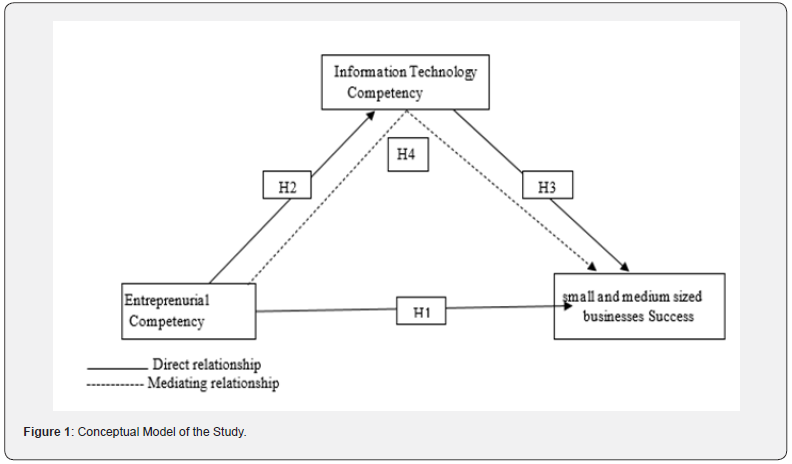
Research Methodology
This research utilized a quantitative approach. The study’s participants were small and medium sized businesses who had established their companies in the Guilan province located in northern Iran. The data collection was done with an adopted survey questionnaire from the available previous literature. Convenience sampling was used to collect the data from March 15, 2024, to May 25, 2024. The responders were given a total of 150 questionnaires. After eliminating the 41 incomplete questionnaires, 209 correct responses were received and included in this study. All the item questionnaires were measured with a five-point Likert scale, which ranged from 1 strongly disagree to 5 strongly agree. Data analysis was done through SPSS and Smart PLS to examine the measurement model and structural model in the study.
Data Analysis and Results
Demographic characteristics of the respondents
Table 1 above shows the demographic data of a sample group. There are 60 females (28.7%) and 149 males (71.3%). The majority of the group falls within the 21-30 years age range (45.5%), followed by the 31-40 years age range (22%). Most participants hold graduate degrees (62.7%). The predominant business type is agro-based (27.8%). Job experience is primarily less than ten years, with 34.4% having under five years and 35.9% having 5 to 10 years.
Descriptive Statistics of the Constructs
Table 2 outlines statistics and associations among three variables: Entrepreneurial Competency (ENC) exhibits moderate variability, with a mean of 4.234 and a high reliability of 0.905. Information Technology Competency (ITC) shows slightly less variability (mean 4.345), with a good reliability of 0.823. small and medium sized businesses Success correlates positively with ENC (.309) and ITC (.316), suggesting moderate relationships. Overall, higher entrepreneurial and IT competencies correspond to increased business success, with statistically significant correlations.
Assessment of Measurement Model
The measurement model in structural equation modelling is critical in establishing if the outer model-composed of Factor loads, Composite Reliability (CR), and Average Variance Extracted (AVE)-is being measured correctly. Furthermore, to evaluate discriminant validity in the measurement (outer) models, the Heterotrait-Monotrait (HTMT) Ratio [14,15] and Criterion are applied. Table 3 provides statistical implications for assessing the measurement (outer) models used in the current study. For these evaluations, [16] state that factor loading should be at least 0.70 or higher and that CR and AVE should be at least 0.70 and 0.50, respectively. The constructs ENC, ITC, and small and medium sized businesses Success demonstrate strong internal consistency, with Cronbach’s alpha values ranging from 0.827 to 0.907. Composite Reliability values, ranging from 0.835 to 0.911, also confirm the constructs’ reliability. Average Variance Extracted values, between 0.71 and 0.743, indicate the proportion of variance captured by the items in each construct. These results bolster the study’s credibility by affirming construct validity and validating the measurement instruments. Table 4 above depicts construct correlations and diagonal values representing the square roots of Average Variance Extracted (AVE). Diagonal values (in bold) should exceed off-diagonal ones. Here, diagonal values exceed off-diagonal ones, confirming satisfactory discriminant validity, as stated by [15]. Each construct’s diagonal value (ENC, ITC, MBS) exceeds correlations with other constructs, validating their distinctiveness. In Table 5 above, [14] state that the HTMT ratio for latent constructs should be smaller than 0.80 to have appropriate discriminant validity. In this case, all correlations fall below 0.8, ensuring satisfactory discriminant validity, as each construct demonstrates adequate differentiation from the others.
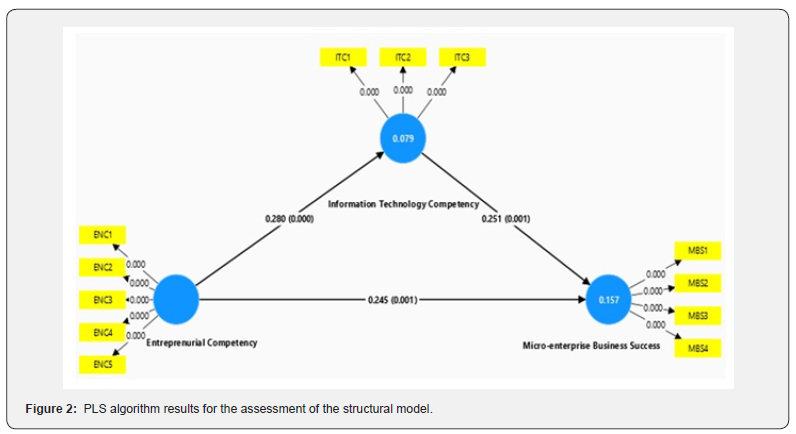
Assessment of Structural Model
The assessment of the Structural equation model begins with the calculation of the coefficient of determination (R2) for each endogenous latent variable. Table 6 below depicts the coefficient of determination(R2) of 0.157, indicating that ENC and ITC explained 15.7 per cent of the overall variance of small and medium sized businesses Success. Meanwhile, R2 of 0.079 shows that ENC explained 7.9 percent of the overall performance of ITC. The assessment model of Predictive relevance (Q2) values of small and medium sized businesses Success and ITC were 0.834 and 0.708, respectively. Hence, the values of the endogenous variables in the model indicate the predictive relevance. Additionally, the study found the effect size (F2) of the independent variables of ENC has a weak impact on small and medium sized businesses Success (0.065) and ITC (0.085), respectively, in the model. Similarly, MBS has also been impacted by ITC (0.069) (Figure 2). In the current study, the bootstrapping method was used with 5000 resamples for the hypothesis testing. The statistical measures of TStatistics and P-Values were employed to ascertain the acceptance of a hypothesis. In the above Table 7 and Figure II, the results demonstrated that ENC has a direct and positive effect on MBS (β = 0245, T-Stat. =3.215, P< 0.001) and ITC (β=0.280, T-Stat.=3.552, P< 0.000). Furthermore, the result showed that ITC has a positive effect on MBS (β=0.251, T-Stat.=3.130, P< 0.001). The results confirm the three direct hypotheses (H1, H2, H3), as evidenced by the high path coefficient, T-statistics> 1.96, and P- value < 0.05 with bootstrapping of 95% confidence interval. As a result, this study substantially affects all direct effects. The results show that information technology competency plays a mediating role in the relationship between entrepreneurial competency and microbusiness enterprise success, and this relationship is positively and significantly correlated. In Table 8, the result shows that the indirect effects hypothesis refers to the mediator. In assessing the result of one mediating hypothesis, the result revealed that ITC mediates between ENC and small and medium sized businesses Success (β= 0.070, T-stat.= 1.962, P-value =0.027). Hence, the mediating hypothesis (H4) was supported. It was found that ITC increased MBS, but ENC directly impacted small and medium sized businesses Success and ITC. It was also revealed that ITC acted as a mediator between ENC and small and medium sized businesses Success, confirming its role in the research model.
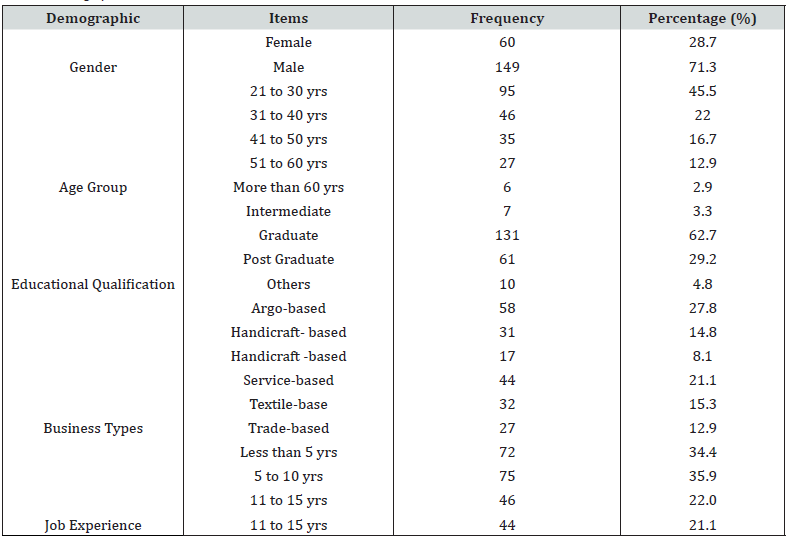
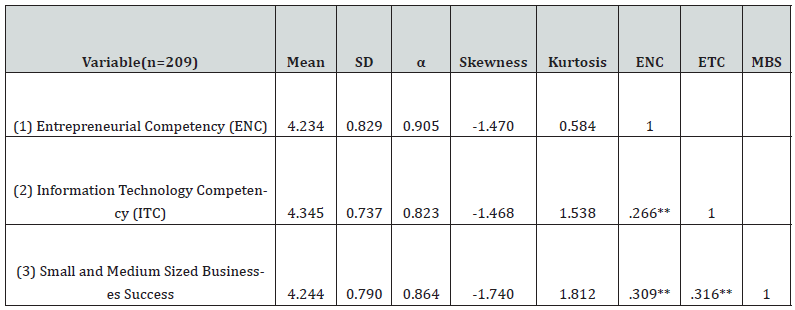
Note: α: Cronbach alpha; SD: Standard Deviation; ** Correlation is significant at 0.01.
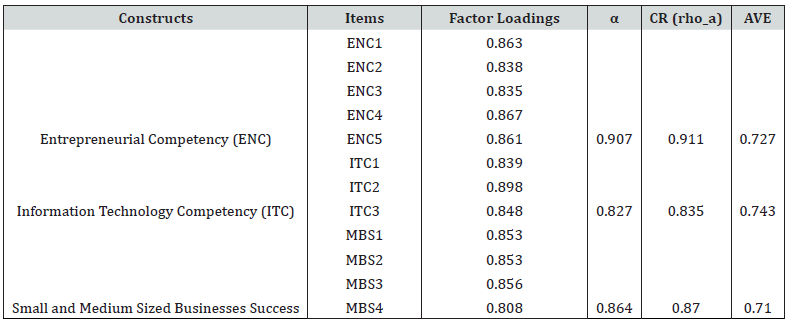
Note: α: Cronbach alpha; AVE: Average Variance Extracted.

Note: The square root of average variance extracted (AVE) is shown on a diagonal in bold.


Note: aMBS; bITC.

Note: ENC: Entrepreneurial Competency, ITC: Information Technology Competency, Small and Medium Sized Businesses Success.

Note: ENC: Entrepreneurial Competency, ITC: Information Technology Competency: Small and Medium Sized Businesses Success.
Discussion
To gain a better understanding, this study investigated crucial variables that underpin entrepreneurial competencies (ENC) and small and medium sized businesses Success, as well as the mediating role of information technology competency (ITC) in this relationship. This study’s findings confirmed the hypothesis (H1) that entrepreneurial competency (ENC) impacts small and medium sized businesses Success. The confirmation of the hypothesis that entrepreneurial competency impacts small and medium sized businesses Success reinforces established theories and empirical evidence in the field of entrepreneurship [17]. It affirms the notion that individual entrepreneurs’ capabilities and characteristics significantly influence their ventures’ performance and outcomes [9]. Next, the finding of hypothesis (H2) of the study, which established a positive relationship between entrepreneurial competency (ENC) and the adoption of information technology (ITC) in microenterprise businesses, aligns with previous research in the field of entrepreneurship [12]. This positive effect emphasizes the pivotal role of ENC in shaping entrepreneurial behaviors and decisions regarding technology adoption in microbusiness enterprises [17]. As a result, they are better equipped to understand the benefits of integrating information technology into their operations and navigate their business. Moreover, the study highlights the impact of ITC adeptness as a channel for exchanging technological knowledge and best practices among their peers [18]. By leveraging their ITC skills, they facilitate collaborative learning environments where information technology adoption is encouraged and supported. This integration of ITC and knowledge-sharing accelerates the diffusion of technological innovations within the microenterprise sector, contributing to overall digital readiness and competitiveness.
Furthermore, the study investigated the proposition outlined in hypothesis (H3), which suggests a positive relationship between information technology competency (ITC) and small and medium sized businesses Success. This finding underscores the crucial role of technology proficiency in driving the success of small and medium sized businesses in today’s digital landscape [10]. Information technology competency encompasses a spectrum of skills, ranging from basic digital literacy to more advanced abilities in utilizing software, online platforms, and data analytics tools. small and medium sized businesses Success that possess a higher level of ITC are better equipped to adapt to technological advancements, capitalize on digital opportunities, and address challenges in an increasingly competitive market environment [19]. The research findings provide convincing evidence to support the hypothesis (H4), which posits that information technology competency (ITC) serves as a mediator in the relationship between entrepreneurial competency (ENC) and small and medium sized businesses Success [20]. This implies that the extent to which entrepreneurs are influenced by their ability to leverage information technology effectively impacts their business outcomes. Entrepreneurs who are well-connected with ITC may have greater access to information, resources, and opportunities related to technology adoption and innovation [21]. This access enables them to develop and enhance their information technology competency, which, in turn, translates into improved business performance and success. Recognizing the mediating role of ITC emphasizes the importance of incorporating digital literacy and technology training into entrepreneurship programs [22] . Entrepreneurs with strong information technology competency are better positioned to capitalize on emerging opportunities in the digital economy and remain competitive in an increasingly interconnected world.
Implications of Study
The implications of these findings extend to entrepreneurs, policymakers, and stakeholders involved in fostering microenterprise development. Entrepreneurs should prioritize investing in technology training and skill development to enhance their digital capabilities and remain competitive in the business. Policymakers and support organizations should prioritize initiatives that promote technology training, facilitate knowledgesharing platforms, and foster a culture of digital innovation within the microenterprise sector. By investing in technology education and support, stakeholders can empower micro-entrepreneurs to harness their full potential and drive sustainable business success in the digital era.
Conclusion
This study has examined the impact of entrepreneurial competency (ENC) and information technology competency (ITC) on small and medium sized businesses Success in the Guilan province located in northern Iran. The findings of the study showed that ENC directly and positively affect the ITC and small and medium sized businesses Success. Additionally, the finding revealed that ITC positively impacts small and medium sized businesses Success. Therefore, the impacts of this study are significant for all direct relationships. Further, the results of one mediating relationship revealed that ITC mediates the relationship between ENC and small and medium sized businesses Success, which is in support of the mediating relationship. Hence, this study shows that microbusiness enterprises need to prioritize ENC and adapt ITC competency to improve and sustain the small and medium sized businesses Success. The study examined the impact of entrepreneurial competency on business success, adding to the body of knowledge while integrating ITC competency. The path analysis’s results verified that information technology and entrepreneurial competency were the cornerstones of small and medium sized businesses Success and directly and indirectly influenced their ability to succeed as business enterprises.
All business enterprises, especially those in the microenterprises sector, must integrate IT competency. This study’s findings emphasize the critical importance of entrepreneurial and information technology competencies in driving microenterprise business success. Further, the study highlights the pivotal role of both entrepreneurial competency and information technology competency in steering the success trajectory of small and medium sized businesses Success. With the rapid advancements in technology and the increasingly interconnected global economy, leveraging information technology has become advantageous and necessary for small and medium sized businesses Success to remain competitive and sustainable. Moreover, the synergy between entrepreneurial competency and information technology competency creates a virtuous cycle of innovation and growth. Entrepreneurs who embrace technology not only enhance their operational efficiency but also unlock new opportunities for value creation and differentiation in the market. By fostering a culture of continuous learning and adaptation, microenterprises can leverage information technology as a strategic asset to fuel their growth aspirations and achieve long-term success.
Limitations of the Study and Scope for Future Research
This study was carried out in the Guilan province located in northern Iran. small and medium sized businesses success sector may limit the applicability of findings to more significant geographic regions. Future research should be undertaken on how entrepreneurial and IT competencies impact micro-enterprise success over time and across diverse sectors and regions for the generalizability of findings. Investigating demographic influences, emerging technologies, policy support, education, and training effectiveness can reveal tailored strategies to enhance micro-enterprise performance, providing valuable insights for practitioners and policymakers.
References
- Awamleh F & Ertugan A (2021) The Relationship Between Information Technology Capabilities, Organizational Intelligence, and Competitive Advantage. SAGE Open 11(2): 215824402110152.
- Eravala KT, Henttonen K, Lampela H (2019) Entrepreneurial competencies in successfully innovative SMEs. International J of Entrepreneurship and Small Business 38(3): 251-276.
- Pulka BM, Ramli A, Mohamad A (2021) Entrepreneurial competencies, entrepreneurial orientation, entrepreneurial network, government business support and MSME performance. The moderating role of the external environment. J of Small Business and Enterprise Development 28(4): 586-618.
- Hadi NU & Abdullah N (2018) The leverage of entrepreneurial skills and traits to business success: A case study of Pakistan's marble industry. International J of Entrepreneurship and Small Business 33(3): 315-334.
- Marei A, Abou-Moghli A, Shehadeh M, Salhab H, Othman M (2023) Entrepreneurial competence and information technology capability as indicators of business success. Uncertain Supply Chain Management 11(1): 339-350.
- Sakib MN, Rabbani MR, Hawaldar IT, Jabber MA, Hossain J, Sahabuddin M (2022) Entrepreneurial competencies and SMEs’ performance in a developing economy. Sustainability 14(20): 1-18.
- Rahoo LA, Arain MWN, Qazi N, Khan MA, Atta F (2023) Impact of Entrepreneurial Skills on Business Success: A Mediating Role of Information Technology Competence. Bulletin of Business and Economics (BBE) 12(3): 519-527.
- Abdullah N, Hadi NU, Dana LP (2018) The nexus between entrepreneur skills and successful business: A decompositional analysis. International J of Entrepreneurship and Small Business 34(2): 249.
- Umar A & Ngah R (2016) The relationship of entrepreneurial competencies and business success of Malaysian SMEs: The mediating role of innovation and brand equity. Advances in Business Research International Journal 2(2): 1-9.
- Abdul RO (2019) Effect of entrepreneurial competencies on the survival of small and medium enterprises in Kenya [PhD Thesis, JKUAT-COHRED].
- Abubakre M, Zhou Y, Zhou Z (2022) The impact of information technology culture and personal innovativeness in information technology on digital entrepreneurship success. Information Technology & People 35(1): 204-231.
- Huang KF (2011) Technology competencies in a competitive environment. J of Business Research 64(2): 172-179.
- Zahoor N, Pepple DG, Choudrie J (2021) Entrepreneurial competencies and alliance success: The role of external knowledge absorption and mutual trust. J of Business Research 136: 440-450.
- Henseler J, Ringle CM, Sarstedt M (2015) A new criterion for assessing discriminant validity in variance-based structural equation modeling. J of the Academy of Marketing Science 43(1): 115-135.
- Fornell C & Larcker DF (1981) Evaluating Structural Equation Models with Unobservable Variables and Measurement Error. J of Marketing Research 18(1): 39-50.
- Hair Jr JF, Howard MC, Nitzl C (2020) Assessing measurement model quality in PLS-SEM using confirmatory composite analysis. J of Business Research 109: 101-110.
- Lovely L, Ottemoesoe RSD, Devie D (2021) Information Technology Capabilities, Organizational Agility, and Competitive Advantage: A Study of Micro, Small, and Medium Enterprises in Indonesia. Petra International J of Business Studies 4(2): 131-141.
- Ahmadi J & Letter T (2021) The impact of IT capability on company performance: The mediating role of business process management capability and supply chain integration capability. J of Social, Management and Tourism Letter 2021(1): 1-16.
- Ferreira ADSM, Loiola E, Gondim SMG, Pereira CR (2022) Effects of Entrepreneurial Competence and Planning Guidance on the Relation Between University Students’ Attitude and Entrepreneurial Intention. The J of Entrepreneurship 31(1): 7-29.
- Yustian O, Suryana S, Furqon C, Hendrayati H (2021) The mediating role of competitiveness between entrepreneurial competence and business success. Management Science Letters 11(1): 93-100.
- Agbenyegah AT & Mahohoma T (2020) The impact of selected entrepreneurial competencies on SMEs performance in Ethekweni regions of South Africa: Theoretical and practical implications. Acta Universitatis Danubius. ØEconomica 16(4).
- Ab Hamid MR, Sami W, Sidek MM (2017) Discriminant validity assessment: Use of Fornell & Larcker criterion versus HTMT criterion. J of Physics: Conference Series 890(1): 012163.






























